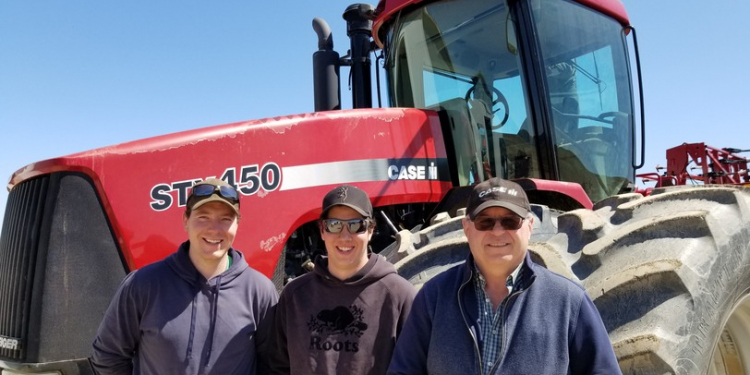Eugene Antworth is working with his two sons to transfer the family’s potato farm to the next generation.

Eugene Antworth has been farming his whole life, although officially it’s only been 42 years. He grew up on his family’s potato farm in Upper Knoxford, N.B. and now is the fourth generation to farm the land — his sons, Ethan and Greyson, are set to be the fifth.
“We’ve been doing a lot of thinking about succession and got a pretty good idea of where we’re going to go with it,” Antworth says in a phone interview, adding he wants to retire in about 10 years’ time.
The farm is just over 3,000 acres and grows processing potatoes for McCain Foods, along with wheat, barley and grass. Antworth started working on the farm straight out of school while his sons both attended university to study plant scient and business before returning to the farm.
“When I started, you went out and got on a tractor and went to work. Today when they start, they had to come to the office and learn the office end of it first,” Antworth says. “When I started, we did the paperwork whenever. Not today, it has to be somebody working at it most of the time.”
Antworth’s wife, Sandy, also works on the farm, assisting with the office work. Sandy did work off the farm as a teacher for 30 years, before retiring five years ago.
The farm has grown over the years. When Antworth first took it over from his father they were working just over 100 acres. As more land became available with neighbours selling, Antworth bought and expanded the farm.
Farming isn’t always easy and 2020 was no exception. When the pandemic hit North America in March, Antworth saw his processing contract volume cut.
“We found out everybody’s still going to eat. It has made it more difficult because of COVID in trying to be careful and not be around (others),” he says.
During seeding and harvest, they hire extra help on the farm. In the spring, the Antworths’ hire 12 people, and in the fall 24. Seasonal hiring was hard this year as many who were out of work due to the pandemic didn’t want to jeopardize receiving CERB or unemployment payments by working too many hours, which seasonal farm work would have caused.
“We have some locals that will come. But a lot of them, nine of them come from the other side of the province. These were people who used to work in the mines or drove trucks of stuff like that, but there was no work on that side of the province,” Antworth explains.
The pandemic wasn’t the only struggle the Antworths faced last growing season. A drought throughout the Maritimes also dragged down their potato production by 15 per cent — overall potato yield in New Brunswick dropped by 23.6 per cent from last year according to Statistics Canada.

“It varies from area to area. It’s just whoever caught rain, and maybe the next area two miles down the road didn’t get any rain. It’s just all over the place,” Antworth says about the growing season.
McCain works with 153 Canadian family farms (globally, that number is a stunning 3,850). Of the 53 processing plants it operates worldwide, eight are in Canada, also located in small, rural communities.








